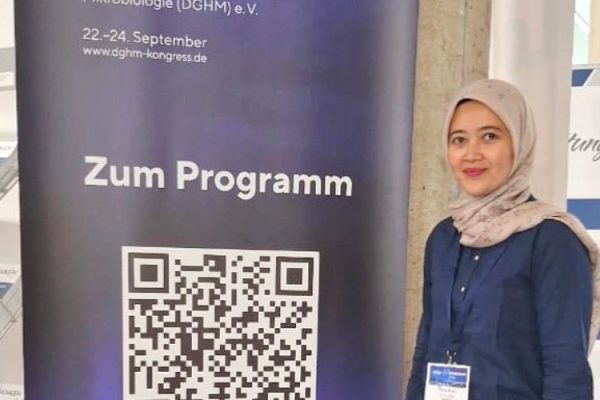Yogyakarta/Jena – September 2025
Tiara Putri, a double-degree doctoral student from the Faculty of Biology, Universitas Gadjah Mada, in collaboration with the University of Greifswald, Germany, has been awarded one of the Poster Prizes at the 77th Annual Conference of the German Society for Hygiene and Microbiology (Deutsche Gesellschaft für Hygiene und Mikrobiologie, DGHM), held this year in Jena, Germany.
The DGHM conference is one of the most renowned microbiology meetings in Europe, attracting hundreds of researchers and clinicians working in the fields of infectious diseases, microbiology, and immunology. Winning this prize underscores the high quality of UGM’s international research collaborations and the contributions of its students to global scientific advancement.
Out of 188 poster presenters from various countries, including Germany, South Africa, Bulgaria, and Algeria, only five participants were selected for the award — with Tiara being among this distinguished group of winners.
The awarded poster, titled “Impact of pneumolysin, hydrogen peroxide, and Streptococcus pneumoniae strains on blood–CSF barrier integrity in a human choroid plexus co-culture model,” presents novel insights into the mechanisms by which Streptococcus pneumoniae, a major human pathogen, compromises the integrity of the blood–cerebrospinal fluid barrier. The study contributes to a better understanding of bacterial meningitis pathogenesis, with potential implications for future therapeutic strategies.
“This recognition is not only a personal honor but also a reflection of the strong academic collaboration between UGM and the University of Greifswald,” Tiara said.
Tiara also shared that the conference was especially meaningful for her because the organizers provided a free childcare facility throughout the three-day conference. Children of participants were cared for by a professional Tagesmutter (childminder), allowing parents to attend the scientific sessions with peace of mind. “I truly appreciated this family-friendly facility that understands the needs of researchers who are also parents. It was very helpful for me, especially since I live in Germany alone with my children and could not leave them at home,” she added.
This achievement shows how strong academic support, combined with a family-friendly conference environment, can truly help researchers (especially those who are also parents of young children) to thrive and gain recognition internationally.




